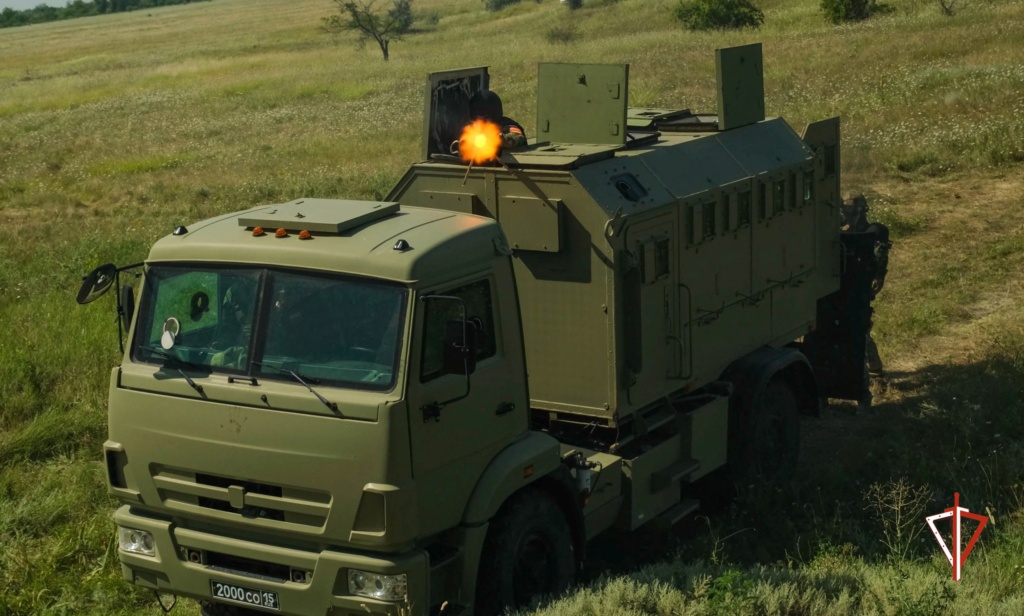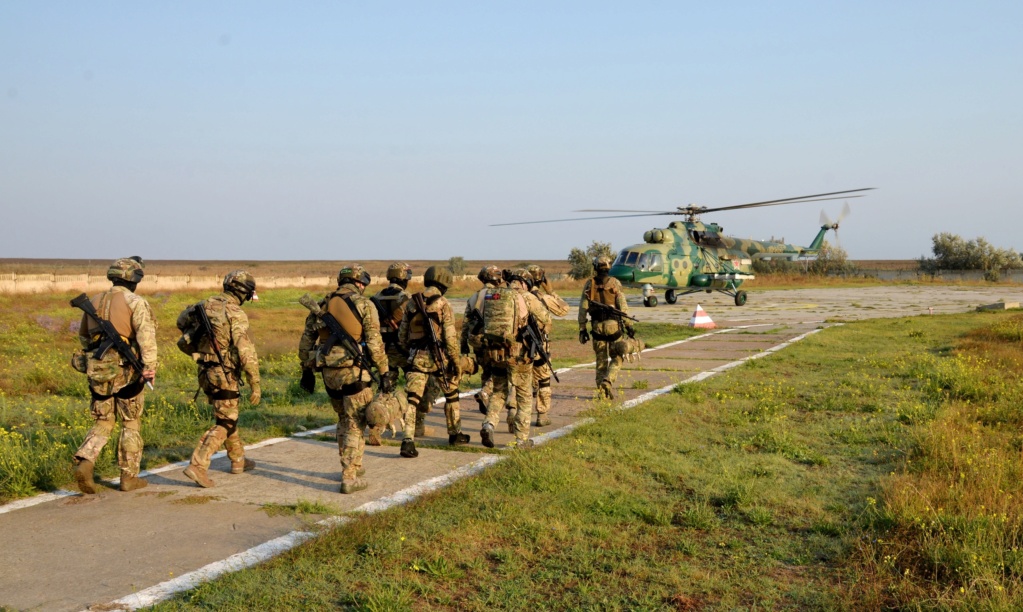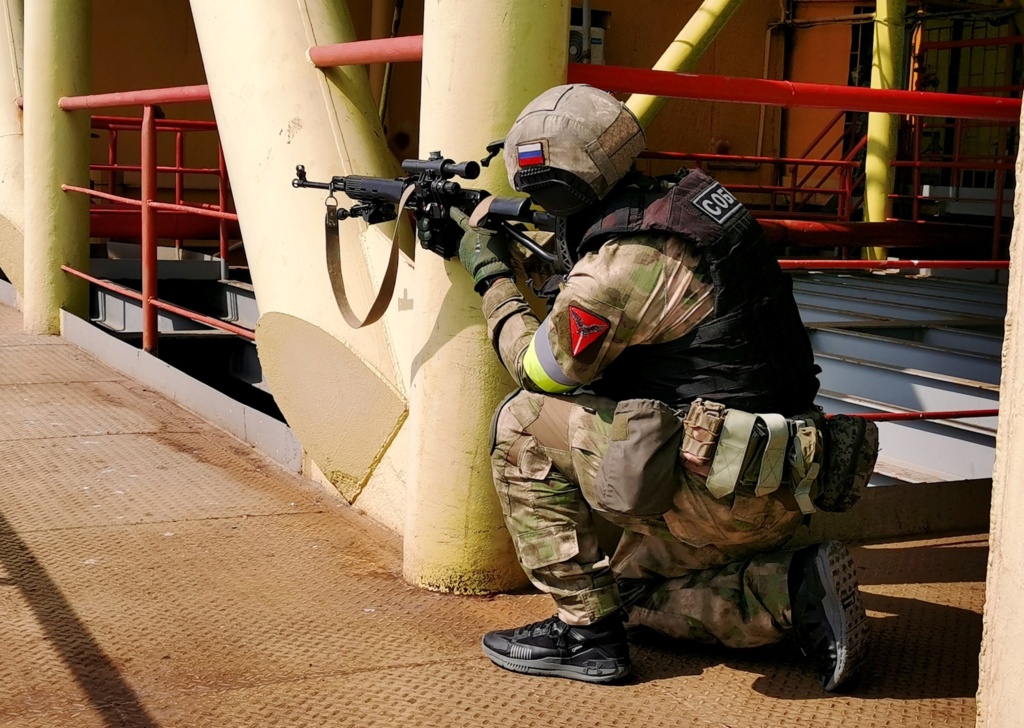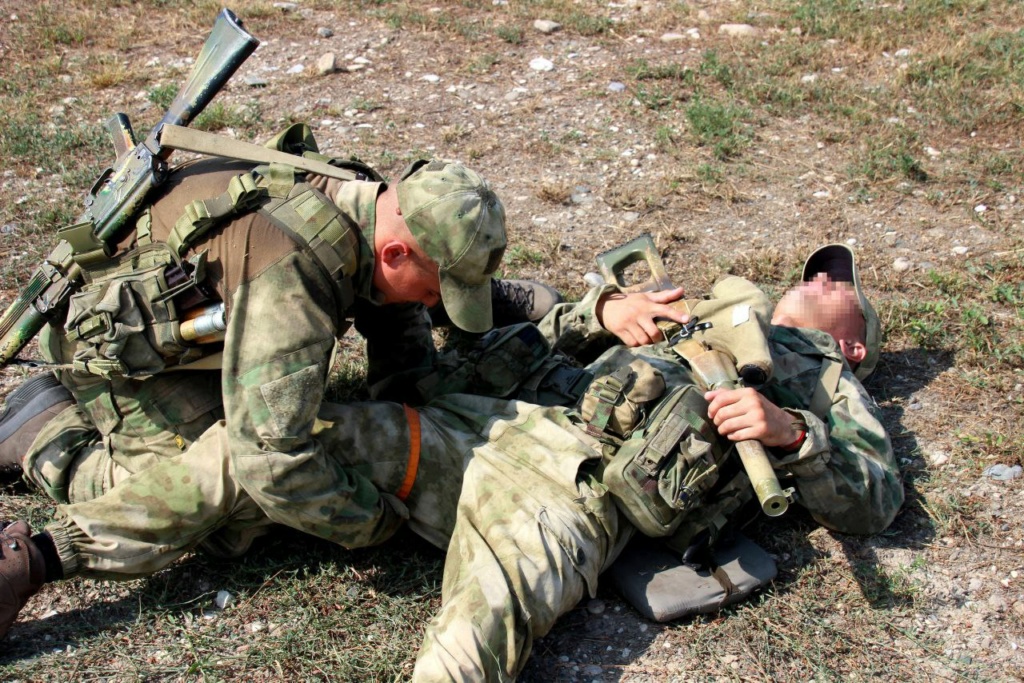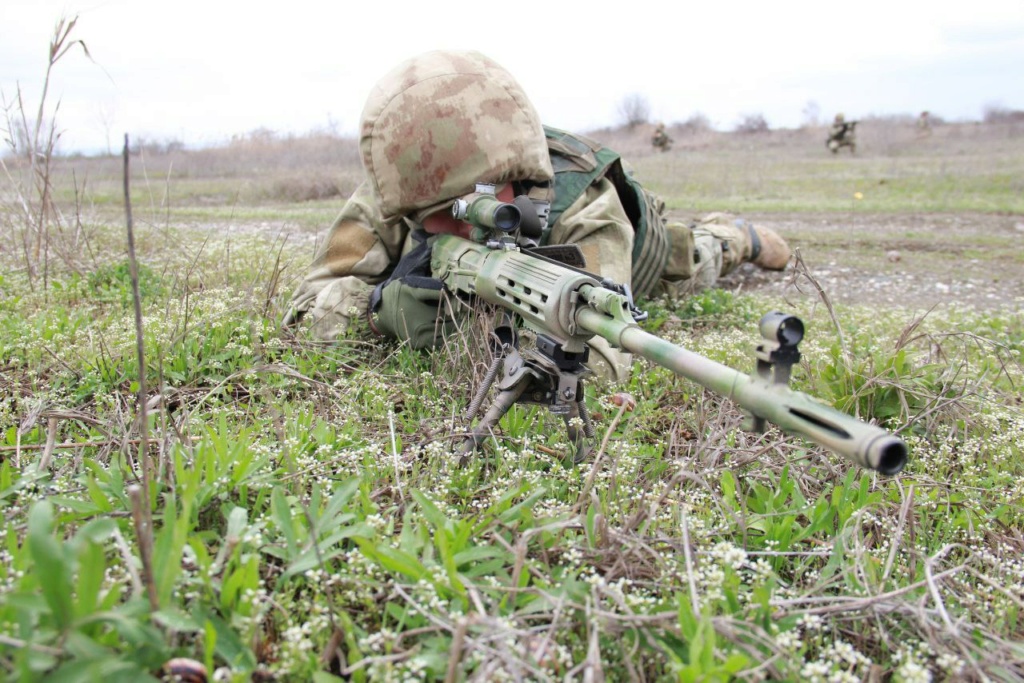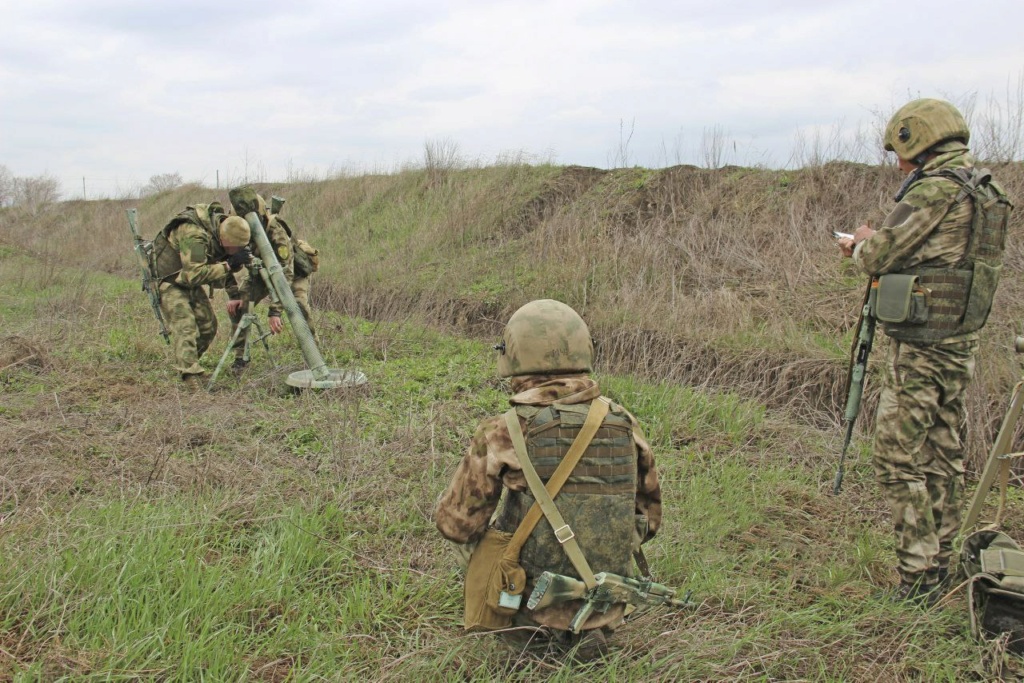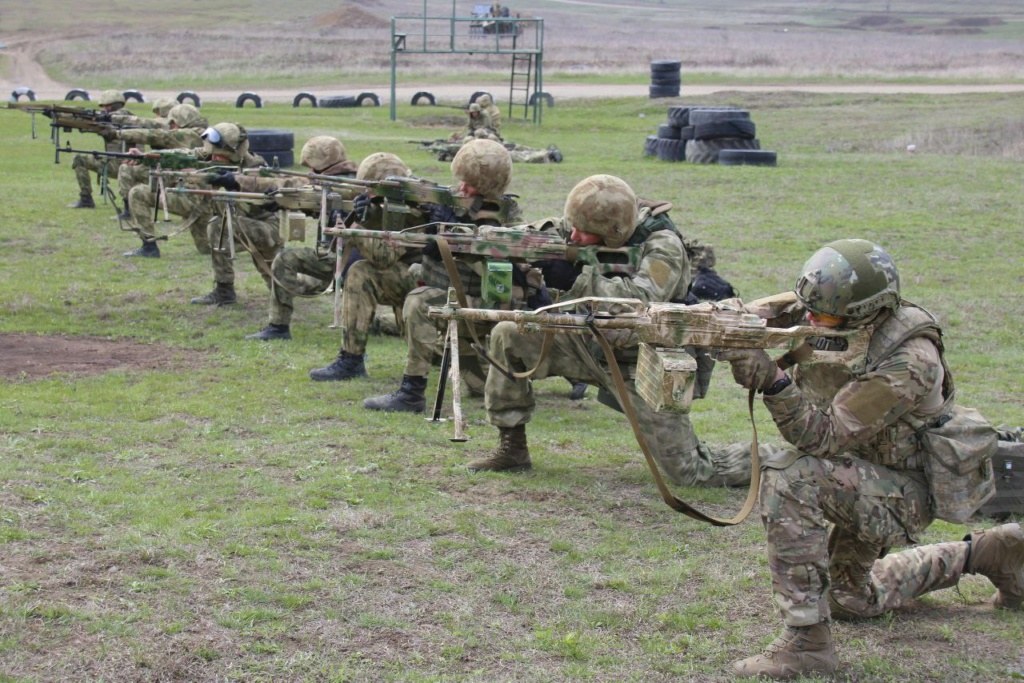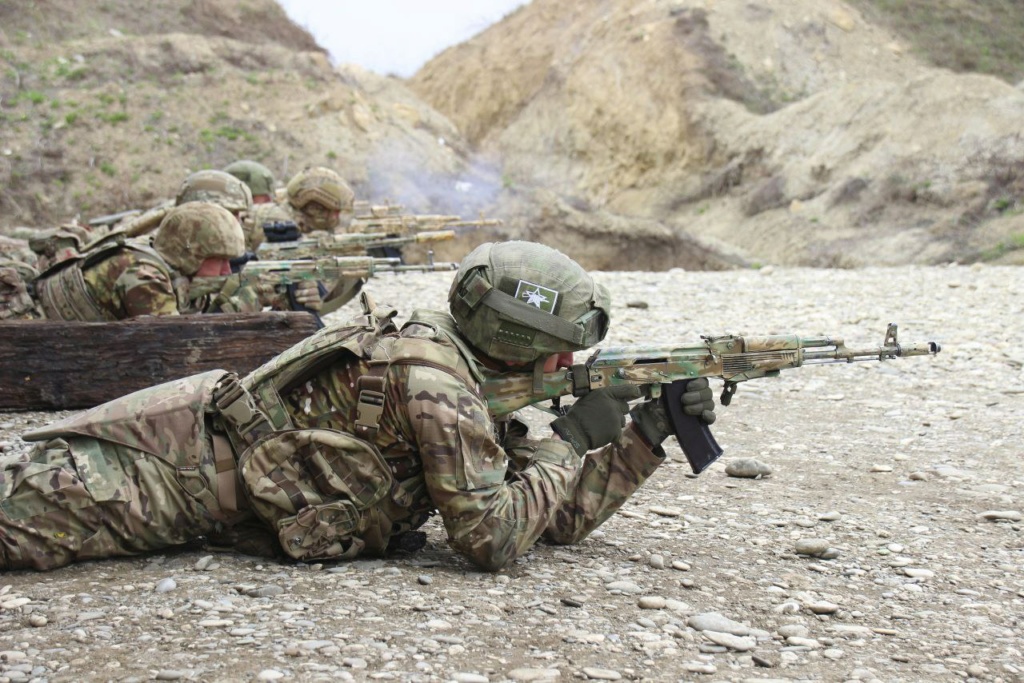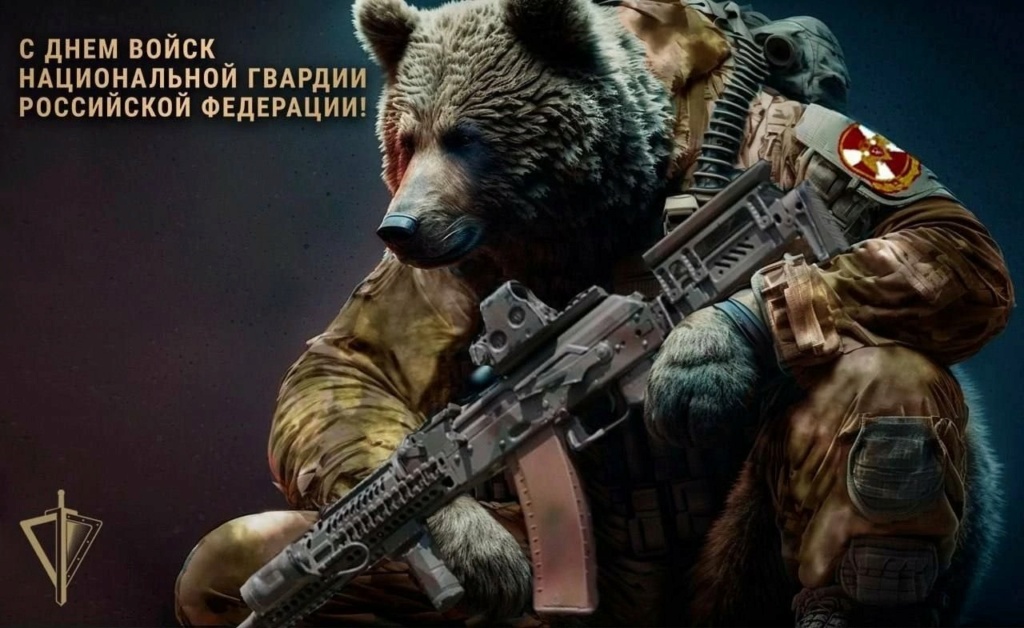Rosgvardia (National Guard of Russia) Thread

Russian_Patriot_- Posts : 1286
Points : 1300
Join date : 2021-06-08
GarryB, franco, flamming_python, d_taddei2, par far, zardof, Hole and Finty like this post

Russian_Patriot_- Posts : 1286
Points : 1300
Join date : 2021-06-08
GarryB, franco, par far, zardof and Finty like this post

Russian_Patriot_- Posts : 1286
Points : 1300
Join date : 2021-06-08
GarryB and par far like this post

Russian_Patriot_- Posts : 1286
Points : 1300
Join date : 2021-06-08
In Kineshma, Rosgvardiya soldiers, employees of the Federal Penitentiary Service, together with the transport police and traffic police conducted counter-terrorism exercises at a water transport facility.
According to legend, the terrorists seized a river pleasure boat and held hostages from among the passengers and crew members on board.
During the negotiation process, the conditional criminals did not give up their intentions, so in order to neutralize them and release the crew and passengers on the ship, a set of measures was carried out with the strong support of the SOBR officers of the Rosgvardiya Department for the Ivanovo region, as a result of which the conditional terrorists were neutralized and the hostages were released.
Such joint exercises are held regularly at transport facilities. Earlier, rosgvardeytsy, together with the police, had already worked out the tactics of freeing hostages on trains and by plane.
According to the results of the event, a high assessment was given to interdepartmental interaction, professional training, as well as the ability to perform service and combat tasks in any situation.
Source:




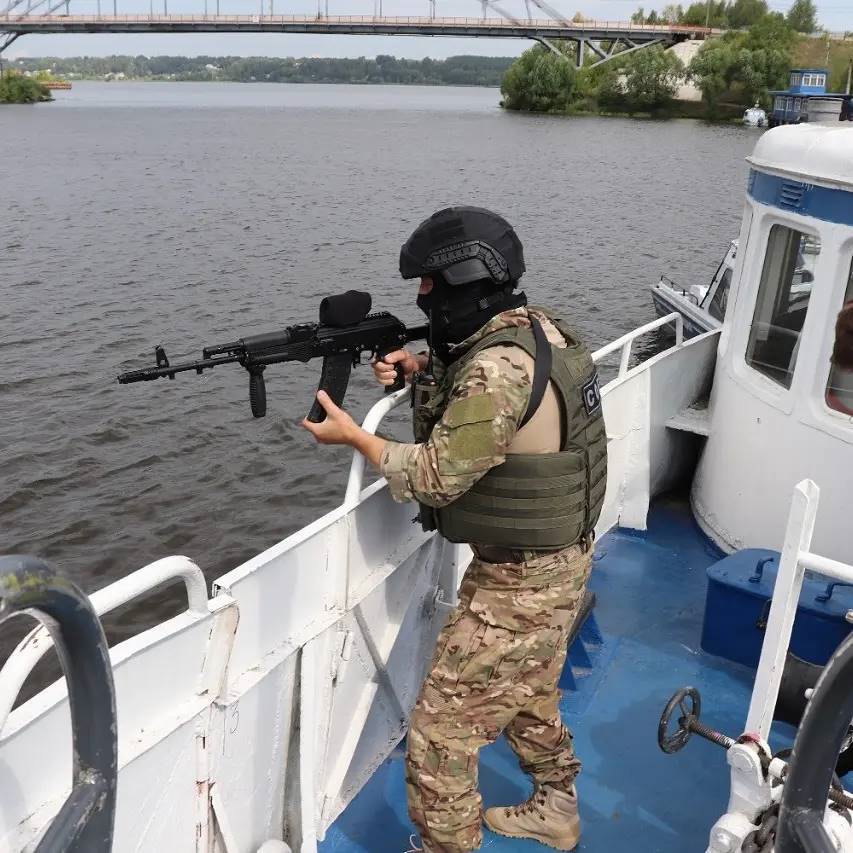

GarryB, par far and zardof like this post

Russian_Patriot_- Posts : 1286
Points : 1300
Join date : 2021-06-08
GarryB, par far and zardof like this post

Russian_Patriot_- Posts : 1286
Points : 1300
Join date : 2021-06-08
GarryB, PapaDragon, zardof and Hole like this post

Hole- Posts : 11118
Points : 11096
Join date : 2018-03-24
Age : 48
Location : Scholzistan
GarryB, The-thing-next-door and Russian_Patriot_ like this post

flamming_python- Posts : 9541
Points : 9599
Join date : 2012-01-30
GarryB likes this post

franco- Posts : 7053
Points : 7079
Join date : 2010-08-18

Russian_Patriot_- Posts : 1286
Points : 1300
Join date : 2021-06-08
GarryB, franco, George1, zardof and Hole like this post

franco- Posts : 7053
Points : 7079
Join date : 2010-08-18
The Commander-in-Chief noted that for almost seven decades, non-departmental security officers have been providing reliable protection of the property of citizens and organizations, taking part in the implementation of measures to ensure anti-terrorist protection of various categories of objects, and also making a significant contribution to ensuring law and order on the streets and in public places.
Army General Viktor Zolotov stressed that thanks to the technological, scientific and personnel potential accumulated over the past years, the service steadily maintains a leading position in solving the tasks of ensuring the security of particularly important and sensitive facilities, strategic enterprises and large infrastructure projects that are key to the successful functioning of our country.
The Director of Rosgvardiya expressed confidence that the planned set of measures for the further development of the service, including the ongoing work on the introduction of modern digital technologies, will provide a qualitative foundation for its progressive improvement and increase the efficiency of activities in the security sector.
The Commander-in-Chief thanked all the personnel of the non-departmental security units of the Rosgvardiya for their courage and professionalism, which have become the hallmark of the service.
Army General Viktor Zolotov wished the veterans long life, cheerfulness and optimism, success in service, new professional achievements, as well as peace, kindness, good health and family well-being to all.
For reference
The beginning of the service was laid by the resolution of the Central Committee of the CPSU and the Council of Ministers of the USSR issued on October 29, 1952 "On the use in industry, construction and other sectors of the national economy of workers released from protection, and measures to improve the organization of the protection of economic objects of ministries and departments." This document not only formed a new division in the internal affairs bodies, but also defined in general terms the structure of its apparatus at various levels.
Today, non-departmental security units carry out their activities in the form of federal state state institutions, which allows them to conclude contracts for the protection of objects and apartments of citizens and fully participate in civil relations with the owners of protected property. Such institutions have been established in each region of the Russian Federation, which, in turn, have an extensive network of branches.
Currently, more than 877 thousand places of residence and storage of citizens' property and about 390 thousand objects of various categories and forms of ownership are under the reliable protection of private security units.
The official activity of the non-departmental security units is not limited only to responding to "alarm" signals coming from protected objects and apartments of citizens - mobile detachments of the detention groups of the service's combatant units, while on patrol routes, make a significant contribution to maintaining public order in the territories served, including actively suppressing crimes and administrative offenses committed on streets, squares, squares and other places of mass stay of citizens.
https://rosguard.gov.ru/News/Article/direktor-rosgvardii-general-armii-viktor-zolotov-pozdravil--lichnyj-sostav-podrazdelenij-vnevedomstvennoj-oxrany--s-professionalnym-prazdnikom
GarryB likes this post

franco- Posts : 7053
Points : 7079
Join date : 2010-08-18
In accordance with the Decree of the President of the Russian Federation No. 556 of September 30, 2021, the conscription of citizens for military service has ended. More than 11 thousand recruits joined the ranks of military units and formations of the National Guard of the Russian Federation.
In addition, the troops of the National Guard of the Russian Federation have completed activities related to the retirement of military personnel who have served the established terms of military service on conscription. More than 7.5 thousand dismissed servicemen were given recommendations for admission to the preparatory departments of state universities at the expense of the federal budget.
Rosgvardiya notes that during the autumn conscription, the number of young men who want to perform their military duty in the ranks of the National Guard of the Russian Federation has significantly increased.
For the reception and training of young recruits, more than 50 training camps were deployed in the troops, which made it possible to carefully study the individual characteristics of each recruit, additionally conduct their medical examination and psychological testing, professionally orient them on specific types of service and combat activities.
During the training camps, meetings of new enlisted servicemen with veterans of the Great Patriotic War and law enforcement forces, conversations with senior conscripts, as well as communication with relatives and friends are organized, which greatly helps to adapt to the conditions of military service faster.
https://rosguard.gov.ru/News/Article/bolee-11-tysyach-novobrancev--popolnili-vojska-nacionalnoj-gvardii-rossijskoj-federacii
GarryB, George1, par far, zardof, miketheterrible and Hole like this post

franco- Posts : 7053
Points : 7079
Join date : 2010-08-18
By the 30th anniversary of the special rapid reaction unit "Lynx", the Rosgvardiya for the first time opens to the general public information about an elite unit designed to perform the most difficult tasks.
The film introduces viewers to the unique history, truly heroic fates of officers and traditions of one of the best special forces units in Russia. For the first time, all this is being told by those who serve in the Lynx Cathedral!
Employees of the "Lynx" SOBRA have been making a significant contribution to the fight against crime and terrorism for more than 30 years. All those who have passed the tough selection for the squad have a special temperament. They are united by common views on life and vocation: to help people in trouble. They are not subject to breakdowns and doubts. In a critical situation, we are ready to make a non-standard decision and act. The specifics of the work makes the officers of the SOBRA keep their finger on the pulse. If they are not on combat duty, then they are preparing for it. They study the enemy, whoever he is. They simulate various situations and repeatedly work them out. Training to the seventh sweat unites the team, helps to understand each other without words.
https://rosguard.gov.ru/News/Article/kinostudiya-rosgvardii-predstavlyaet-dokumentalnyj-film--osobyj-pocherk-o-specialnom-otryade-bystrogo-reagirovaniya-rys
NOTE: one of the most elite Special Forces units of the National Guard. Reportedly numbering around 200 personnel, stationed outside of Moscow and is the National Special Rapid Response unit (SWAT to western comparisons)
Hole likes this post

franco- Posts : 7053
Points : 7079
Join date : 2010-08-18
The director of the Rosgvardiya, Army General Viktor Zolotov, congratulated the personnel and veterans of the units, wished all the personnel health, family well-being and new successes in service for the good of the Fatherland!
The Commander-in-Chief noted that over more than half a century of history, the tasks of the service have gradually expanded with the introduction of best practices and approaches to ensuring state control in established areas of activity, which allowed it to rightfully establish itself as an essential element in the system of law and order and state security.
The Head of the department stressed that the employees and employees of the departments professionally and efficiently perform responsible tasks to ensure compliance with legislation in the field of weapons and private security and detective activities, fully implement the powers to control the activities of legal entities with special statutory tasks, and also make a great contribution to improving the anti-terrorist protection of objects of the fuel and energy complex of our country.
Army General Viktor Zolotov expressed his conviction that the potential of the state control units and licensing and permitting work of the National Guard troops of the Russian Federation will continue to strengthen, which to a large extent should be served by the successful work on a full-scale transition to the practical application of modern digital platforms and technologies in official activities.
Currently, the Main Directorate of State Control and Licensing and Licensing Work of the Federal Service of the National Guard of the Russian Federation, as well as specialized units of the territorial bodies of the Rosgvardiya, provide control over 3.7 million owners who use more than 6.5 million weapons, and persons who have received permits to store and carry weapons. In addition, Rosgvardiya oversees 17.5 thousand private security organizations, 678 thousand private security guards, for 829 private detectives, controls the activities of 21 security units of legal entities with special statutory tasks and departmental security, and also conducts security checks of almost 6.5 thousand objects of the fuel and energy complex.
One of the main activities of the Main Department of State Control and Licensing Work of the Rosgvardiya is the implementation of a set of measures aimed at providing citizens and legal entities with public services in the areas of arms trafficking, private detective and security activities, including in electronic form.
In 2021, licensing and permitting departments received more than 2.8 million applications for the provision of public services in established areas of activity.
https://rosguard.gov.ru/News/Article/general-armii-viktor-zolotov-pozdravil-sotrudnikov-podrazdelenij-gosudarstvennogo-kontrolya-i-licenzionnorazreshitelnoj-raboty-rosgvardii-s-profession
GarryB and Hole like this post

franco- Posts : 7053
Points : 7079
Join date : 2010-08-18
The generally accepted date of birth of army-type armed formations that ensure the internal security of Russia is March 27 (old style), 1811, when, by decree of Emperor Alexander I, regular provincial companies and teams were relocated to the provincial capitals and military battalions of the internal guard were formed from them, which became one of the most important parts of the state's security system.
The internal guard ensured the continuous replenishment of the active army, the protection of order in settlements, and ordered the escort of the flow of exiles and convicts. Organizationally, it consisted of internal garrison (provincial) battalions and county invalid teams, which formed a Separate internal guard corps from 1816, which lasted until 1864, when its functions were transferred to local troops. In 1886, convoy teams were created, which formed the Imperial Convoy Guard. Local troops and convoy guards were part of the security system of the Russian state and were responsible for the internal security of the empire.
After the October Revolution of 1917, the Soviet government created its own security and protection agencies. Along with the Red Army, auxiliary (or special) troops were formed, which included armed formations of various departments that needed combat strength. They also included the Corps of Troops of the All-Russian Emergency Commission (CHEKA) under the Council of People's Commissars of the RSFSR, which was formed in 1918 from detachments under the Cheka and its local bodies to ensure the internal security of the state. On January 1, 1919, the Corps was renamed the Cheka troops.
By a decree of the Soviet of Workers 'and Peasants' Defense of May 28, 1919, the Cheka troops were united with other auxiliary troops to form the Internal Security Forces of the Republic (VOHR). Subsequently, the VOHR troops were repeatedly reorganized (since 1920-the Internal Service troops (VNUS), since 1922-the troops of the State Political Administration (GPU) under the People's Commissariat of Internal Affairs (NKVD) of the RSFSR, since 1923-the troops of the Special State Political Administration (OGPU) under the Council of People's Commissars of the USSR, since 1934 – internal security of the NKVD of the USSR, since 1937-internal troops of the NKVD of the USSR), but their tasks remained the same-protecting the population from any threat, including external ones. In 1927, the OGPU troops, along with other tasks, were assigned to protect industrial enterprises and structures that are important for the defense of the country.
During the Great Patriotic War (1941-1945), formations and units of the NKVD troops fought the enemy in the border areas, defended Moscow and Leningrad (now St. Petersburg), the Brest Fortress, Kiev, Odessa, Voronezh, Stalingrad (now Volgograd), defended the North Caucasus, and fought heavy battles on the Kursk Bulge. At the same time, they provided effective protection of the rear of the active army, as well as thousands of objects, tens of thousands of kilometers of communications, which made it possible to thwart the massive impact of German sabotage groups. The NKVD troops played an important role in the deployment of the partisan movement in enemy-occupied territory. One of the tasks of the internal troops during the war years was to provide radio resistance to the enemy. The NKVD troops also served as garrisons in the liberated areas, guarded railways, military factories and other important facilities, escorted and guarded prisoners of war, fought banditry, and provided government HF communications, which allowed maintaining a high level of state and military administration during the war.
In addition, they ensured the activities of three international conferences of the heads of State of the anti – Hitler coalition (the Tehran Conference in 1943, the Yalta and Potsdam conferences in 1945). The personnel of the NKVD troops reliably guarded the conference venues, the routes of movement of government delegations.
After the end of the war, the internal troops were part of various law enforcement agencies of the country. Since 1946, they were part of the Ministry of Internal Affairs of the USSR formed instead of the NKVD of the USSR. Later, since 1947, only the internal troops were transferred to the Ministry of State Security (MGB) of the USSR, and after the unification of the Ministry of Internal Affairs and the MGB into one department in 1953 – again to the Ministry of Internal Affairs of the USSR. In 1960, after the abolition of the USSR Ministry of Internal Affairs, formations and units were transferred to the republican Ministry of Internal Affairs. Since 1962, they have been part of the Ministries of Public Order Protection (MOO) of the Union republics. Since 1966, the internal troops were part of the formed Union-republican MOO of the USSR, which in 1968 was transformed into the Ministry of Internal Affairs of the USSR.
Since 1946, they were additionally assigned to protect research institutions, nuclear industry and rocket engineering enterprises. For this purpose, special commandant's offices were created, on the basis of which special units of the internal troops later appeared. In 1966, special motorized police units were created as part of the internal troops.
Internal troops protected the population from natural and man-made disasters, participated in the elimination of the consequences of accidents at the Mayak plant in 1957, at the Chernobyl nuclear power plant in 1986. In 1979-1989, they took part in solving international problems on the territory of Afghanistan, and in 1988-1991, they were assigned the task of eliminating the consequences of interethnic conflicts in Central Asia, Transcaucasia and Transnistria.
After the collapse of the Soviet Union in December 1991, the formations and military units of the internal troops stationed on the territory of Russia were subordinated to the Ministry of Internal Affairs of Russia. They continued to perform official combat tasks: they participated in the protection of public order, ensured public safety and the state of emergency; protected important state facilities and special cargo, correctional labor institutions; escorted convicts and persons in custody.
In the late XX – early XXI centuries, the main purpose of the internal troops was to counter internal threats to national security, namely, attempts to violently overthrow the constitutional order, the activities of illegal armed groups, and terrorism.
In order to increase the effectiveness of countering modern challenges and threats, to ensure State and public security, and to protect human and civil rights and freedoms, the Federal Service of National Guard Troops of the Russian Federation (Rosgvardiya) was established by Decree of the President of Russia Vladimir Putin on April 5, 2016.
The basis of the new power structure was the internal troops of the Ministry of Internal Affairs of Russia. Rosgvardiya also includes management bodies and divisions of the Ministry of Internal Affairs of Russia for control in the sphere of arms trafficking, private security activities, special rapid reaction units (SOBR) and mobile special purpose units (OMON) of territorial internal Affairs bodies, the Special Purpose Center of the Rapid Reaction Forces and Aviation of the Ministry of Internal Affairs of Russia, and air units of the Ministry. Rosgvardiya also includes the dog training department of the General Staff of the Internal Troops, FSUE Okhrana and the licensing and licensing service. At the beginning of 2017, the Federal State Unitary Enterprise Okhrana of Rosgvardiya was joined by the "Departmental Protection of Industrial Facilities of the Russian Federation" of the Ministry of Industry and Trade. Since the beginning of 2018, Rosgvardiya has been responsible for the control shooting of firearms.
As a result, Rosgvardiya has combined two fully functional units in its structure. These are special and operational forces, as a power component for direct counteraction to acts of internal aggression. As well as units that provide direct protection of objects of various sectors of the economy, perform the functions of state control over other forms of security activities in the country and the turnover of weapons, including those used in the activities of non-state security structures.
Director of the Federal Service of National Guard Troops of the Russian Federation – Commander-in-Chief of the National Guard troops of Russia is Army General Viktor Zolotov.
According to the provisions of the federal law of July 3, 2016 "On the troops of the National Guard of the Russian Federation", the leadership of the troops of the National Guard of the Russian Federation is carried out by the President of the country.
The National Guard troops are a military organization of the state, designed, among other things, to solve law enforcement tasks. This specificity largely determines the nature of their service and combat activities. They take part in the protection of public order, ensuring public security; protect important state objects, special cargo, structures on communications in accordance with the lists approved by the Government of the Russian Federation; participate in the fight against terrorism and extremism; take part in ensuring the state of emergency, martial law, the legal regime of the counter-terrorist operation; as well as in the territorial integrity of the provide assistance to the border guard agencies of the Federal Security Service in protecting the state border of the country; exercise federal state control (supervision) over compliance with the legislation of the Russian Federation in the field of arms trafficking and in the field of private security activities, as well as over ensuring the security of fuel and energy facilities, over the activities of security units of legal entities with special statutory tasks, etc. departments of departmental security. On them According to the decision of the President of the Russian Federation, the security of top officials of the country's constituent entities (heads of the highest executive bodies of state power of the constituent entities of the Russian Federation) and other persons is entrusted.
The National Guard troops make a significant contribution to the fight against terrorism, extremism, and organized crime. They perform tasks together with the Joint Group of Troops in the North Caucasus, a limited contingent in the Syrian Arab Republic. In Syria, the Russian National Guard contingent makes a significant contribution to the stabilization of the situation in the country by ensuring the security of humanitarian actions, seizing weapons, ammunition and explosives, and performing special tasks.
During the special operation for the demilitarization and denazification of Ukraine, which began on February 24, 2022, rosgvardeytsy perform all assigned tasks together with the Russian Armed Forces. In particular, they are involved in the delivery of humanitarian aid to the residents of Ukraine, protect the Zaporizhia nuclear power plant, and neutralize unexploded mines, artillery shells, and improvised explosive devices.
https://translated.turbopages.org/proxy_u/ru-en.en.fd1b1a7a-64217281-547bd082-74722d776562/https/ria.ru/20230327/natsgvardiya-1860343400.html
GarryB and Hole like this post

Hole- Posts : 11118
Points : 11096
Join date : 2018-03-24
Age : 48
Location : Scholzistan
GarryB, franco, zardof and lancelot like this post

franco- Posts : 7053
Points : 7079
Join date : 2010-08-18
- 110 detachments (platoon / company size) of OMON / SOBR units
- 45 detachments (company / battalion size) of SN / ON / SM units
- 24-25,000 total
GarryB, flamming_python, zardof and Hole like this post

franco- Posts : 7053
Points : 7079
Join date : 2010-08-18
The law provides for the possibility for citizens who are in the reserve and who previously served in the Russian Guard in positions that provide for the assignment of special police ranks, in case of mobilization, to be sent to serve in the FSVNG. Only if they refuse to serve in the Russian Guard will they be sent to the Armed Forces of the Russian Federation. This, as we understand it, is primarily about former employees of the OMON and SOBR units.
Such a decision looks quite reasonable, given that, for example, a police lieutenant colonel who commanded a SOBR unit may have the military rank of “private” and experience in serving as, say, a shooter or driver. But it is unlikely that his mobilization as a private for such a position will be justified, given the experience of serving in the special forces and the availability of certain knowledge and skills.
In addition, the law allows the signing of short-term contracts for service in the troops of the National Guard. This will allow many veterans of the special forces and the police to return to duty for some time. The duration of short-term contracts is up to 1 year.
Separately, it is worth noting that all servicemen and employees of the Russian Guard are now prohibited from posting data in the media and social networks, including photographs, videos about themselves, other servicemen, employees, including those dismissed from service, as well as members of their families, which would allowed to locate them.
https://topwar-ru.translate.goog/223131-prezident-rossii-razreshil-mobilizaciju-v-rosgvardiju-ee-byvshih-sotrudnikov-so-specialnymi-zvanijami-policii.html?_x_tr_sl=auto&_x_tr_tl=en&_x_tr_hl=en
kvs and Hole like this post

franco- Posts : 7053
Points : 7079
Join date : 2010-08-18
So, the changes concern the law "On the National Guard Troops". According to the document, the terms "weapons" and "military equipment" are replaced by "weapons" and "military equipment".
The head of the Russian Guard, Viktor Zolotov, told Izvestia on June 27 that the department intends to introduce tanks into its troops . He noted that this issue was discussed with Putin.
On the same day, the official representative of the Russian Guard, Valery Gribakin, added that the tanks and artillery in service with the service would help to operate more effectively during the special operation in Ukraine and respond to new hostile challenges. He recalled that until the early 2000s, the internal troops of the Ministry of Internal Affairs, whose successor is the Russian Guard, had their own tank units. Subsequently, due to the reform of the troops, they abandoned them, Gribakin specified.
https://iz-ru.translate.goog/1554399/2023-08-04/rosgvardiia-poluchila-pravo-imet-na-vooruzhenii-tiazheluiu-voennuiu-tekhniku?_x_tr_sl=ru&_x_tr_tl=en&_x_tr_hl=en&_x_tr_pto=wapp
flamming_python, kvs, Sprut-B and Hole like this post

franco- Posts : 7053
Points : 7079
Join date : 2010-08-18
MOSCOW, August 23 - RIA Novosti. Holding KMZ (Kingisepp Machine Plant) has fulfilled the contract for the supply of six Afalina boats to the Russian Guard, a total of 40 units have been delivered, Mikhail Danilenko, managing director of the holding, told RIA Novosti.
KMZ specializes in the production of patrol boats for the Russian law enforcement agencies : the Ministry of Emergency Situations, the Russian Guard, the FSB .
"This year we completed the contract from 2022 for the supply of six Afalina boats for the Russian Guard, the total series is about 40 units," Danilenko said.
https://ria-ru.translate.goog/20230823/afalina-1891636440.html?_x_tr_sl=ru&_x_tr_tl=en&_x_tr_hl=en&_x_tr_pto=wapp
Hole likes this post

franco- Posts : 7053
Points : 7079
Join date : 2010-08-18
At the moment, as part of the "United Grouping of the Armed Forces of the Russian Federation in the South-Western Theater of Operations", there is a corresponding grouping of troops (forces) of the Federal Service of the National Guard of the Russian Federation ("Rossgvardiya").
It counts...
- personnel (l \ s) – up to 24.4 thousand servicemen of the NG RF troops and police officers
- armored combat vehicles (including armored vehicles) - up to 530 units
- artillery systems \AS (of different caliber) - 212
- helicopters – 18
In particular...
1) GV "Vostok"
- l\s - 7119
- BBM – 181
- AC – 64
- helicopters – 6
2) GV "West"
- l\s - 6815
- BBM – 143
- AC – 42
- helicopters – 6
3) GV "Yug"
- l\s - 10481
- BBM – 206
- AC – 106
- helicopters – 6
All this punitive "splendor" is reduced to..
- battalion tactical groups (BTGr) – 5
- simply, "tactical groups" of different kinds and styles - up to 40
- consolidated divisions of the rospolizia (also of different types) - 111, of which "OMON" - 75, "SOBR" - 35
The main tasks that these punishers "perform" in the occupied Ukrainian territories are as follows...
- ensuring the regime of martial law in the occupied territories, including the checkpoint regime in the operational rear of the grouping of Russian troops
- ensuring the organization and conduct of events, the so-called "territorial defense" in the occupied territories
- so-called "filtration" and "barrier" measures...
And also, a whole bunch of "passing" tasks... starting with the "support of public order", ending with the forceful support of counterintelligence activities of the fi-si-bi ri-fi operational groups...
https://t.me/s/zvizdecmanhustu

franco- Posts : 7053
Points : 7079
Join date : 2010-08-18
- A new Rosgvardiya brigade, the 116th Operational Brigade formed in the Donetsk Republic.
- Made up of 3 OPN's (Operational Purpose Regiments) and a total of around 6,000 servicemen.
- HQ and 902nd OPN at Chystiakove (about 70 km east of Donetsk City)
- 901st OPN at Snizhne (Donetsk-Luhansk border, about 90 km southwest of Luhansk City and 10 km east of Chystiakove)
- 900th OPN at Melekine (about 20 km southwest of Mariupol)
In maybe related news, the Cascade Volunteer brigade which was made up of ex-Ministry of the Interior veterans from the Donetsk and Luhansk Republics has reportedly been disbanded.

franco- Posts : 7053
Points : 7079
Join date : 2010-08-18
“The Federal Service of the National Guard Troops of the Russian Federation, together with the Ministry of Internal Affairs of the Russian Federation, carried out work to transfer to the Russian Guard employees of the internal affairs bodies of the Russian Federation who filled positions in the special forces units “Grom”, drug control units of the territorial bodies of the Ministry of Internal Affairs of Russia at the regional level. Currently, measures for the transfer of employees have been implemented in full,” RIA Novosti quotes a fragment of the statement. The division's transition process began in December 2023.
The special unit "Grom" appeared in 2003 as part of the Federal Service for Drug Control. Since 2016, "Grom" has become a special unit of the Russian Ministry of Internal Affairs.
Radio Sputnik reported that the Federation Council approved laws on liability for discrediting Russian National Guard volunteers.
https://radiosputnik-ru.translate.goog/20240107/rosgvardiya-1920044571.html?_x_tr_sl=ru&_x_tr_tl=en&_x_tr_hl=en&_x_tr_pto=wapp
NOTE: the last personnel figure that I have for the GROM units is 3,000, which was when they were placed under control of the Ministry of Internal Affairs in 2016. They were similar to the SOBR units (SWAT in Western equivalency) but only half as many, totally focused on the Drug trade. However after the changes in 2016, they were all that was left as Special Forces (SWAT) under direct police control.
kvs, Hole and lancelot like this post


